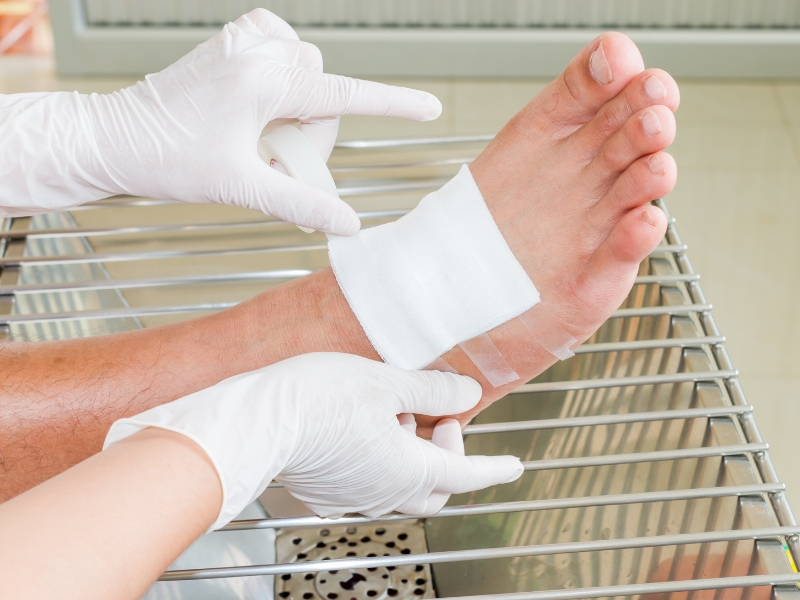Wound care is a critical part of recovery for individuals dealing with injuries, surgeries, or chronic conditions. While many assume hospital visits are necessary for proper care, home nurses can provide expert wound care services in the comfort of your home. This article will discuss how a home nurse can help with wound care and dressings, why it’s important, and when to consider this type of service for your family.
What Does a Home Wound Care Nurse Do?
A home wound care nurse specialises in assessing, cleaning, and dressing wounds in a home environment. This service particularly benefits individuals recovering from surgery or injuries, or managing chronic conditions such as diabetes. These nurses are trained to provide professional and compassionate care tailored to each individual’s specific needs. They may also work in tandem with other support services offered for individuals needing care, ensuring a more complete care plan.
What Are the Benefits of Home Care Compared to Hospital Visits?
When deciding between home care and hospital visits, it’s important to consider the advantages of receiving care at home. Below is a comparison table highlighting the benefits of choosing home wound care over hospital-based care.
| Benefit | Home Wound Care | Hospital Visits |
| Convenience | Care provided in the comfort of your home | Requires travel and waiting times |
| Personalised Care | Tailored to individual needs and schedules | Care may be standardised due to hospital settings |
| Comfort and Familiarity | Healing in a familiar, stress-free environment | The hospital environment may cause stress or anxiety |
| Cost-Effective | Often more affordable than hospital visits | Hospital care can be expensive and may involve transport costs |
| Continuity of Care | Consistent visits by the same nurse | Frequent change of staff and care protocols |
| Flexibility | Flexible scheduling to fit your needs | Limited visiting hours and schedules |
Why is Wound Care Important for Effective Healing?
Effective wound care is essential to prevent complications like infections and ensure the wound heals properly. A clean and properly dressed wound will heal faster and with fewer risks, reducing the likelihood of scarring or ongoing health issues. Here are the key reasons why wound care is vital:
- Prevents Infection: Proper cleaning and dressing keep bacteria out and reduce the risk of infection.
- Promotes Faster Healing: Proper care ensures that the wound heals quickly and efficiently.
- Minimises Scarring: A clean and well-maintained wound heals with less scarring and better visible results.
- Reduces Pain: When wounds are managed effectively, the discomfort caused by exposure to contaminants is reduced.
- Maintains Comfort: Proper wound care ensures patients remain comfortable during recovery.
Do Home Nurses Provide Care for Chronic Wounds?
Yes, home nurses are trained to deliver comprehensive care for chronic skin ulcers and other wounds that don’t respond well to standard treatment. Chronic wounds often require specialised care and consistent monitoring to ensure they heal correctly and prevent further complications. In managing chronic wounds, home nurses:
- Assess the condition regularly: Keeping a close eye on changes to the wound’s appearance.
- Adapt care plans: Adjusting treatments and techniques based on the wound’s response.
- Provide continuous support: Offering long-term care to promote healing over an extended period.
- Educate the patient and family: Teaching how to care for chronic wounds and prevent complications at home.
When Should You Consider Hiring a Home Nurse for Wound Care?
There are several situations where hiring a home nurse makes sense. If you’re looking for expert assistance and peace of mind during the healing process, home nursing care offers a convenient and efficient solution. Consider hiring a home wound care nurse when:

- Surgery recovery: After surgery, proper wound care is essential to avoid infection and promote healing.
- Chronic conditions: If a family member has diabetes, vascular issues, or other conditions that result in slow-healing wounds.
- Pressure sores: Preventing and treating pressure sores is critical for those who are bedridden or immobile.
- Frequent dressing changes: When wounds require frequent and careful dressing changes to heal properly.
- Specialised care: If the wound requires advanced care techniques that cannot be provided at home without a skilled nurse.
Hiring professional nursing care for wound management ensures that your loved one receives the best care possible while providing peace of mind during the recovery process.
How Does a Home Nurse Ensure Proper Wound Dressing Techniques?
Proper wound dressing is essential to avoid infection and ensure proper healing. Home nurses are trained to use the right materials, tools, and techniques to dress wounds effectively. A home nurse ensures proper wound dressing techniques by:
- Choosing the right dressing materials: Selecting the appropriate dressings, such as hydrocolloid, alginate, or foam, based on the wound type.
- Proper hygiene practices: Ensuring clean hands and sterile equipment to avoid contamination.
- Monitoring wound condition: Checking the wound during each visit to ensure it’s healing and adjusting dressing as necessary.
- Pain management: Managing discomfort during dressing changes by using local anaesthetics or non-invasive methods.
- Educating the patient and family: Teaching families how to change the dressing safely when needed.
By following these practices, a home nurse ensures that each dressing change supports the healing process and minimises risks.
Does Insurance Cover Home Wound Care Services?
In many cases, home wound care services may be covered by insurance, but this largely depends on the details of your specific policy. Generally, if a healthcare provider deems the care medically necessary and issues a prescription, insurance companies may offer partial or full coverage. However, the extent of coverage can vary significantly, whether you’re relying on private health insurance, navigating NDIS eligibility for home nursing care, or accessing government-funded services. Several factors can influence what is covered, including:
- The severity of the wound: Chronic or complex wounds may have a higher chance of being covered.
- Doctor’s recommendation: A referral or prescription from a healthcare provider is often required.
- Type of insurance: Coverage may vary depending on private health insurance, NDIS, or government-funded services.
- Frequency of visits: Insurers may provide coverage for a certain number of visits or treatments.
Before starting any services, it’s essential to check with your insurance provider to understand your coverage options for home nursing care.
Conclusion: Wound Care at Home is a Step Towards Healing
Home wound care nurses are invaluable when it comes to ensuring effective wound recovery. From chronic conditions to post-surgical care, a professional home nurse can provide expert care and support to your loved ones, allowing them to recover comfortably at home.
For more information on in-home nursing services, you can get assistance from Montessori Care’s nursing team. Your loved ones deserve the best care available.
